Supported by AMI’s Outreach and Engagement Grant, the Health Humanities Outreach (H2O) Initiative has enabled local people to improve drinking water quality in Itchi-Agu in Nigeria, a village where more than half of households had reported diarrhoea.
The Health Humanities Outreach (H2O) Initiative is a novel community engagement initiative that provides the grounds for the collaborative convergence of science and arts towards the successful delivery of sustainable development goals (SDGs) 3, 5 and 6 in sub-Saharan Africa.
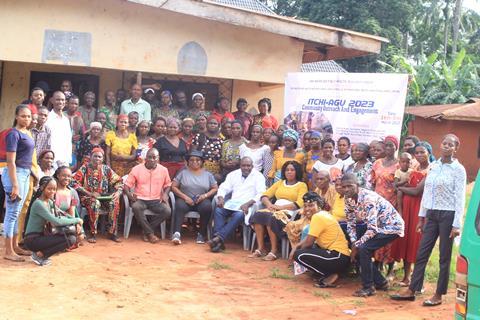
The overarching aim is to address Water, Sanitation, and Hygiene (WASH) challenges, and empower communities to take charge of their own well-being through evidence-based microbiology.
This community engagement initiative has four key components: WASH surveys (pre- & post-intervention); awareness creation and advocacy via Media, Edutainment and Theatre for development (TfD); training workshops on affordable water testing and treatment options (3Ts: Testing, Teaching and Treating); and collection of water samples for laboratory analysis and health risks assessment.
Rural community
Itchi-Agu is located in the Igbo-Eze South LGA of Enugu State, Nigeria, about 11 km from the University of Nigeria, Nsukka.
In this rural community that depends entirely on streams and springs, as high as 75.3% of the 110 households practice open defecation and about 91.4% of this population do not treat their water to make it safe for drinking, as revealed in previous surveys.
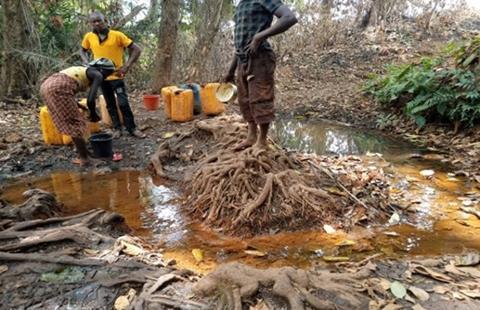
The Itchi-Agu outreach and engagement activities were held from December 01, 2022 to July 31, 2023. The baseline prevalence of diarrhoeal diseases in all age groups in Itchi-Agu rural community was established, based on records at the Community Health Centre and survey-determined self-reported cases.
Health centre visits
Of a total number of 516 visits recorded at the centre, the diagnosis was not recorded in 209 cases, and of the 307 cases in which diagnosis was reported, 36 were diarrhoea cases, giving a prevalence of 11.7% (36/307). Diarrhoea ranks second only to malaria (208/307; 67.8%) as the major reason for health centre visits.
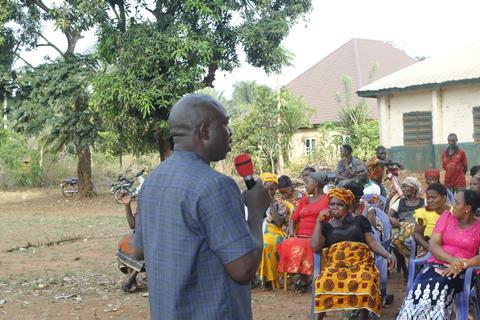
Our survey of 110 households revealed that self-reported diarrhoea was recorded for 54.5% of the households, and 31.8% of the cases were in children under 5 years old. These revelations underscored the urgency and importance of our intervention.
Turning the tide
The quality of water (collected from sources and household storage containers) at Itchi-Agu was dire, with every tested sample revealing faecal contamination. This was a major contributor to the high incidence of diarrhoeal diseases in the community.
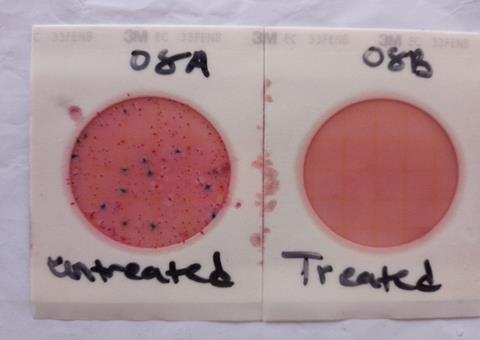
A total of 100 community members (60 female adults, 19 male adults and 21 female youths) were given hands-on training on using Portable Microbiology Laboratory (PML) kits to test their water for contamination and taught how to treat their water, mainly with chlorine. These workshops not only increased awareness but also equipped participants with vital skills.
The impact of this intervention was palpable and positive: Community members can now identify contamination in water and are eager to treat their water before use. Twenty per cent (22/93) of Itchi-Agu households are now treating their water before drinking, compared to the 8.6% that reported they treat their water to make it safe for drinking in the pre-intervention survey.
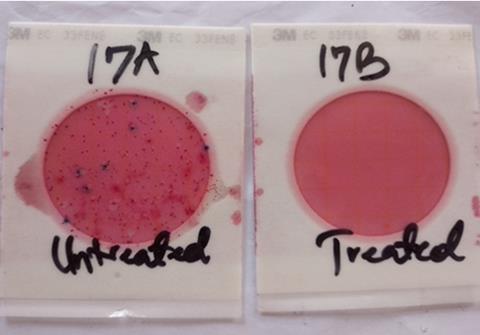
The self-reported prevalence of diarrhoea in children under five has decreased from 31.8% to 14.7%, attesting to the transformative power of informed education and practical training. Water treatment is expected to significantly reduce the incidence of diarrhoeal diseases.
Almost all of the 79.8% of Itchi-Agu households that reported that they are not yet treating their water indicated in a post-intervention survey that they would treat their water should Water Guard be available for their use. We therefore pledged to provide a seed support of 300 bottles of Water Guard. These have been purchased and were delivered to the community at a meeting in September.
Impassioned community members
A highpoint of the outreach was the formation of the community’s Water Source and Quality Monitoring Committee (WSQMC). Comprising impassioned community members, this seven-man committee would be instrumental in every facet of monitoring to ensure community-driven sustainability of the newfound knowledge and a determination to safeguard their community’s health.
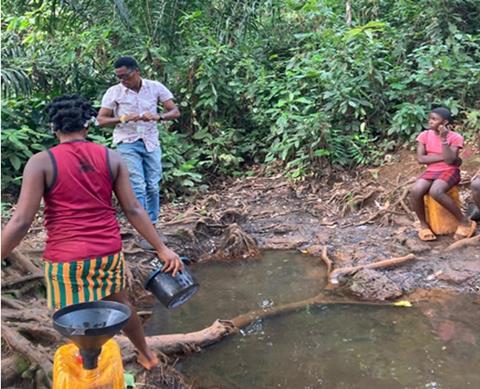
Additionally, a total of 48 persons (OWHN Africa volunteers and WPHRG members) were trained via a repeat of the workshop on the theme: Community-driven development through outreaches – experiences from projects. enabling them to actively engage in development projects.
Community feedback
The impact of our efforts reverberates in the testimonials of community members.
HRH Ikechukwu Okeh, Igwe Ikeorha I, said: “This initiative is a blessing to my community. It is aimed at bringing good health to my people.”
Women’s leader Lolo Nkeiruka said: “I thank God for the WPHRG team that visited our community. We are excited that the team has come to test our water to know if it’s safe for drinking. We are eager to test our water and we are happy that a remote community like ours has been remembered.”
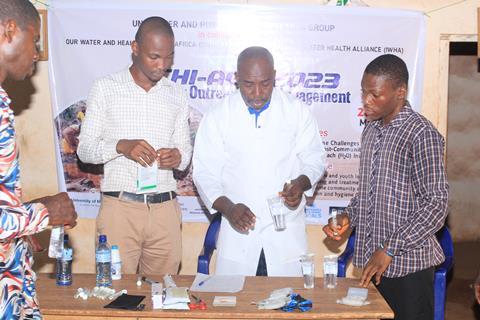
We are poised to continue providing technical support to the Water Source and Quality Monitoring Committee (WSQMC), ensuring a sustainable approach to maintaining water quality. In the face of prevailing challenges, we propose an innovative e-health approach, leveraging mobile phone technology.
We extend our deepest gratitude to Applied Microbiology International for their invaluable support in making our outreach a resounding success, to Our Water and Health Network Africa for partnering with us, and to International Water and Health Alliances, who supported us with the Portable Microbiology Laboratory materials. Together, we have forged a brighter, healthier future for Itchi-Agu.
Transformative model
The impact of the “Tackling Water, Sanitation and Hygiene Challenges and Transforming University Rural Host-Communities through Health Humanities Outreach (H2O) Initiative” extends far beyond this initial implementation.
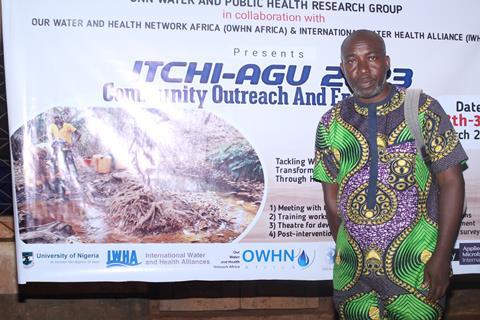
The Itchi-Agu outreach success has been shared at International Conference on Water in Africa, held June 4-8th 2023 and in a compelling video documentary, accessible through Facebook and YouTube.
Our goal is to inspire others, and promote the replication of this transformative model in communities facing similar challenges worldwide.
Vincent Chigor, University of Nigeria, Nsukka
Topics
- Applied Microbiology International
- Be inspired
- Clean Water
- coliform
- Community
- diarrhoeal disease
- Health Humanities Outreach (H2O) Initiative
- Itchi-Agu
- Middle East & Africa
- One Health
- OWHN Africa
- Sample preparation, filtration, detection and treatment techniques for water-borne pathogens
- University of Nigeria
- Wastewater & Sanitation
- Water Guard
- Water Source and Quality Monitoring Committee







No comments yet